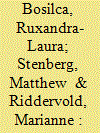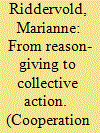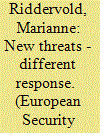|
|
|
Sort Order |
|
|
|
Items / Page
|
|
|
|
|
|
|
| Srl | Item |
| 1 |
ID:
177998


|
|
|
|
|
| Summary/Abstract |
Why did the European Union (EU) launch a naval operation in response to the migration crisis, despite the humanitarian character of the challenge at hand, doubts about the effectiveness of a military response, and the EU’s traditional focus on civilian means? Integrating institutionalist theory and the literature on crisis response, this article argues that EUNAVFOR MED Operation Sophia is an example of copying through contingent learning wherein the EU’s response to the migration crisis was shaped by naval missions Operation Mare Nostrum and Operation Atalanta. While the former set a precedent for a naval response to migration in the Mediterranean, the latter provided an off-the-shelf institutional blueprint for the design and implementation of Operation Sophia. In a crisis situation characterised by high uncertainty, and with little time to rethink policies or to create new structures, EU political actors used contingent learning to quickly evaluate potential policy responses and institutional reforms, leading them to the decision to copy past institutional designs and practices previously considered successful. This finding has relevance beyond the case of Operation Sophia, as it contributes to a better understanding of why a particular type of policy or action is chosen in times of crisis and urgency.
|
|
|
|
|
|
|
|
|
|
|
|
|
|
|
|
| 2 |
ID:
108668


|
|
|
|
|
| Publication |
2011.
|
| Summary/Abstract |
What happens to EU (European Union) foreign policy when the EU has military force at its disposal? Will it then still be correct to talk of the EU as a 'normative' power, or will military capabilities make the EU more inclined to act as a traditional great power and instead promote its interests on the world scene? This article aims to contribute to an answer by studying why the EU launched its first naval operation, operation Atalanta. The analysis suggests that taking responsibility for the long-term protection of humanitarian aid to Somalia was a mobilizing argument behind Atalanta and that this has been followed up in practice. Opposed to what one would expect of a traditional actor, the EU has not prioritised to protect European ships and has bound itself to global law when using force against pirates. Piracy is defined as criminal acts and pirates have been treated in accordance with their human rights.
|
|
|
|
|
|
|
|
|
|
|
|
|
|
|
|
| 3 |
ID:
110773


|
|
|
|
|
| Publication |
2011.
|
| Summary/Abstract |
The aim of this article is to contribute to the further development of deliberative theory-to make it more applicable to research on EU integration-by establishing alternative and more concise micro-mechanisms to those of the rationalist bargaining perspectives. It is suggested that the micro-mechanism through which deliberation has an effect on outcomes is what is termed argument-based learning, which means that an actor accepts the validity of a presented argument so that (s)he acts upon it. Moreover, the article differentiates between three types of argument-based learning considered relevant in the EU context. On this basis, it suggests a two-step analytical approach for studies of EU decision-making processes. In trying out the empirical relevance of the framework, it is applied to a case where one would not expect agreements on common EU policies to have been reached due to argument-based learning, namely EU coordination towards the Maritime Labour Convention (MLC). The framework proved helpful in accounting for agreements that are puzzling from a rationalist perspective.
|
|
|
|
|
|
|
|
|
|
|
|
|
|
|
|
| 4 |
ID:
160086


|
|
|
|
|
| Summary/Abstract |
This article adds to our understanding of the role of norms in the European Union’s (EU) response to the migration crisis by conducting a critical assessment of the EU’s anti-smuggling naval mission “Sophia”. Is Sophia in line with the normative standards the EU has set for itself in its foreign policies? Conducting the analysis in two steps in line with the main criteria of a humanitarian foreign policy model – first exploring Sophia’s launch and then assessing Sophia’s in theatre behaviour – findings suggest that although concerns for migrants at sea mobilised the initial launch of the mission, the mission is not conducted in line with key human rights principles. As the operation mandate is amended and updated with new tasks, and as the EU-NATO in theatre cooperation increases, the EU is moving further away from what one would expect of a humanitarian foreign policy actor.
|
|
|
|
|
|
|
|
|
|
|
|
|
|
|
|
| 5 |
ID:
181166


|
|
|
|
|
| Summary/Abstract |
The global commons – the High Seas, Antarctica, the Atmosphere, and Outer Space – are resource domains outside the authority of states. Historically, the global commons have been practically inaccessible and thus rarely subject to sovereignty claims and international regulations. With technological advances and environmental developments, the global commons have become a key site for international relations (hereinafter IR). In spite of often competing claims from state and non-state actors to these areas, the global commons have remained mainly cooperative. This is not what one would expect from most IR perspectives in a close to anarchical environment and a volatile geopolitical international environment. This Special Issue sets out to address this puzzle by asking: To what extent and why is there little conflict in the global commons? For this purpose, this introduction develops a common framework that distinguishes between three models and corresponding hypotheses of the factors affecting the level of cooperation and conflict in these domains. While two are based on realist and liberal IR perspectives, we draw on constructivism, political theory, and law to develop a third model, called the Human Heritage model. To conclude, this introduction also sums up the findings and discusses their implications for the global commons and IR studies.
|
|
|
|
|
|
|
|
|
|
|
|
|
|
|
|
| 6 |
ID:
134071


|
|
|
|
|
| Publication |
2014.
|
| Summary/Abstract |
When the European Union (EU) launched its first military naval mission, EU NAVFOR Somalia, Atalanta, the states who are members of both the EU and the North Atlantic Treaty Organization (NATO) made a political choice: to prioritize the EU over NATO in their multilateral military efforts to fight piracy and its consequences. Thereby, Atalanta challenges the conventional assumption that EU security cooperation will remain limited. It also challenges the widely held belief that the European states will chose to act through NATO if dealing multilaterally with international security issues. How can we explain this decision? This analysis suggests that it can be explained in two phases where different mechanisms were at work. In the first phase, which can be accounted for from a neo-realist perspective, France, who held the Presidency, used particular favorable geopolitical conditions to put an autonomous EU operation on the agenda. However, agreement on the EU option cannot be explained as a result of strategic bargaining. Instead, in a second phase and in line with an alternative hypothesis building on the theory of communicative action, the EU member states came to support the French suggestion due to legitimacy considerations regarding the legal framework of the two operations
|
|
|
|
|
|
|
|
|
|
|
|
|
|
|
|
|
|
|
|
|